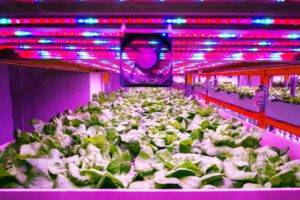The UK has recently welcomed one of its most technologically advanced indoor farms in Gloucestershire, boasting remarkable capabilities in salad production.
This vertical farm utilises controlled, consistent climate conditions to accelerate salad growth, achieving rates three times faster than traditional outdoor agriculture.
Under specialised lighting and in a warm, humid atmosphere, lettuce, basil, and various herbs flourish within the facility. Head grower Glyn Stephens describes the operation as a “high-tech factory,” highlighting the significant technological and engineering components involved.
The farm resembles a warehouse, with rows of trays stacked vertically, totaling 14,500 square meters of growing space. The environment maintains a temperature of 27 degrees Celsius and 75% humidity, providing optimal conditions for plant growth.
Basil, for example, reaches maturity from seed in just 18 days, a significant acceleration compared to outdoor cultivation. Additionally, by producing locally rather than relying on imports from countries like Spain or Morocco, the farm reduces carbon emissions associated with transportation.
While the farm consumes substantial electricity, primarily for LED lighting and climate control systems, it operates on renewable energy sources. This reliance on renewable energy helps mitigate its environmental impact.
Vertical farms offer protection from weather-related risks such as floods and droughts, as well as pest infestations due to tight biosecurity measures. However, the substantial energy requirements have posed challenges for some vertical farm operators, as evidenced by the bankruptcy filing of US-based Aerofarms in June 2023.
Read more:
One of UK’s ‘most advanced’ vertical farms opens in Gloucestershire

